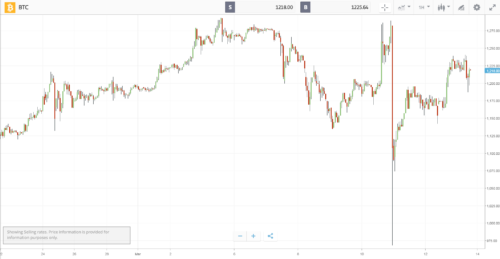After three years of deliberation, the SEC has decided to reject the application to list a Bitcoin-based ETF on Friday. The news came as a disappointment to many Bitcoin traders, and none were more disappointed than the Winklevoss twins, who filed the application. Following the decision, the Bitcoin crashed nearly 18%, after having reached a record high earlier on Friday, crossing the $1,300 mark.
Cryptocurrencies can fluctuate widely in prices and are therefore not appropriate for all investors. Trading cryptocurrencies is not supervised by any EU regulatory framework. Your capital is at risk.
According to a statement made by the SEC, the reason for rejecting the application is that “the significant markets for Bitcoin are unregulated” and therefore it cannot be traded on Wall Street. Since the filing was not for the specific ETF, but rather, a regulatory change that will enable such ETFs to be approved, the decision could potentially block all future requests for Bitcoin-based financial instruments, pushing the cryptocurrency further away from mainstream trading.
The filing was submitted by Cameron and Tyler Winklevoss, most notably known for their legal dispute with Facebook founder Mark Zuckerberg, who have since established themselves as two of the world’s most prominent Bitcoin investors. In the days leading up to the decision, Bitcoin was trading higher than ever, surpassing the record levels it reached in 2013. Many traders believed that the ETF would be approved, and tried to profit from the decision, sending Bitcoin prices higher. However, despite crashing significantly, Bitcoin was still trading above $1,100 and has not reverted to the below-$800 lows seen in early 2017.
What’s next for Bitcoin?
There’s no doubt the SEC’s decision shocked many traders, who believed we are at the beginning of a new dawn for Bitcoin. If approved, the ETF would have marked the first time Bitcoin exposure was available to traditional traders. The cryptocurrency already solidified its status as a highly sought-after asset, and having the SEC’s seal of approval would have given it a significant boost. However, despite this decision, Bitcoin still has a lot of allure for many investors.
Over the past few months, Bitcoin has established itself as an alternative safe-haven for currency traders. If up until recently gold was the default go-to asset for times of high volatility in the currency market, now Bitcoin is giving the precious metal a run for its money. In fact, the demand for Bitcoin is so high, that a single Bitcoin surpassed the price of an ounce of gold several times in recent weeks.
There is a scenario in which Bitcoin will actually benefit from this decision. Keeping it separate from traditional markets means it is less affected by forces from within the market. While it would have no-doubt given it a significant price boost, in the long-run, Bitcoin could still be the next-generation safe-haven. In late 2016, Bitcoin was in high demand in China, due to the weakening of the Yuan. Local traders turned to Bitcoin as a safe-haven, and it is possible that this trend will be seen in other markets.
The currency market is extremely volatile to begin with, and 2017 could prove to be quite turbulent. The Federal Open Market Committee is likely to announce several rate hikes this year, which will cause volatility in the USD, and a few European countries are holding elections this year – so the Euro might also become unpredictable. Not to mention the Brexit cloud still hovering over the GBP and the imminent triggering of Article 50, which will signal the beginning of the UK’s departure from the EU. Therefore, despite the denial of the ETF filing, Bitcoin will remain an alluring investment option for many traders.
Cryptocurrencies can fluctuate widely in prices and are therefore not appropriate for all investors. Trading cryptocurrencies is not supervised by any EU regulatory framework. Your capital is at risk.


